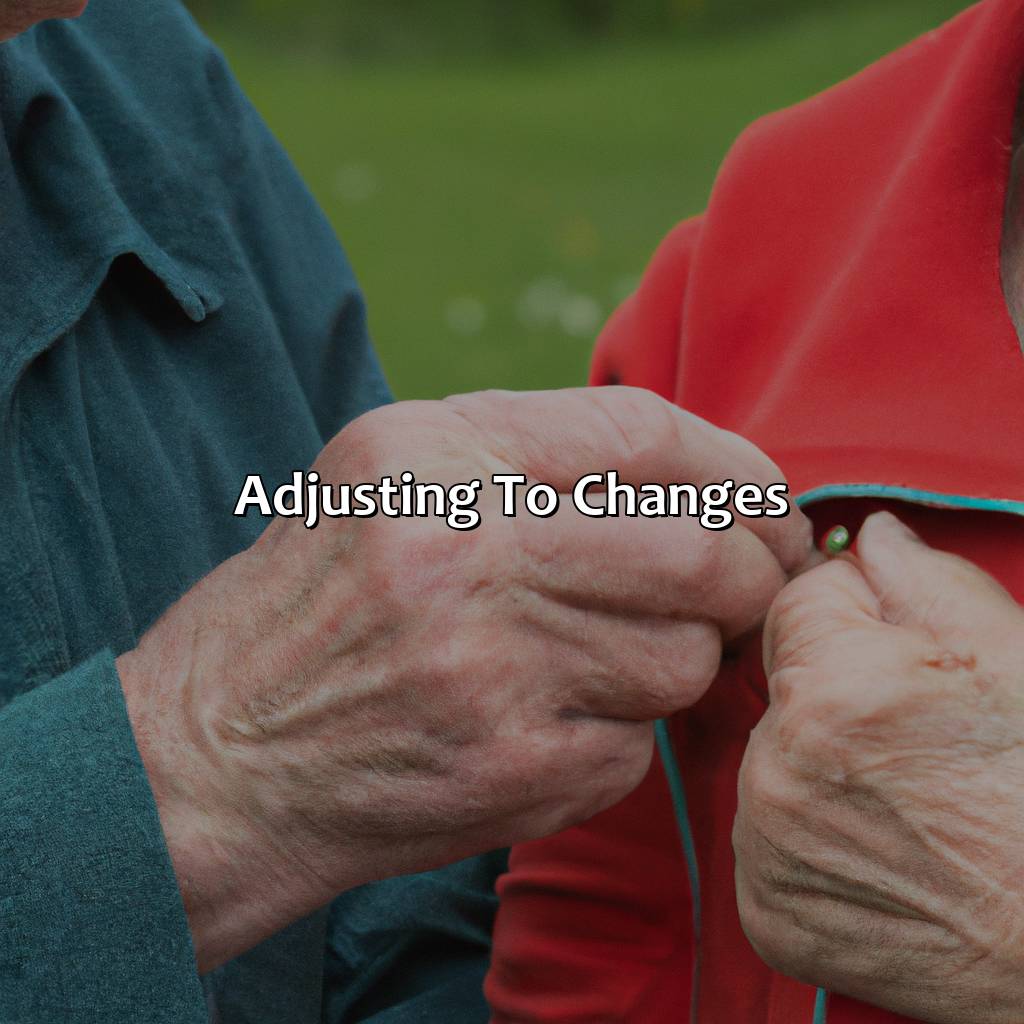How To Survive Retirement With Your Spouse?
Key Takeaway:
- Preparation for retirement is critical and involves financial planning, emotional preparation, and mutual decision making to ensure a comfortable and stress-free retirement with your spouse.
- Establishing healthy communication is key to a successful retirement. Active listening, respectful dialogue, compromise, and conflict resolution can help couples overcome challenges and maintain a harmonious relationship.
- Shared hobbies and interests can help keep the spark alive in a relationship during retirement. Couples can explore new activities, spend quality time together, and find common ground to keep their love and connection strong.
- Time spent apart is also important in retirement. Personal space and independence can keep couples balanced and fulfilled. Pursuing individual interests and hobbies can also bring new perspectives and experiences to the relationship.
- Health and wellness are critical in retirement. Paying attention to physical, emotional, and mental health and creating a supportive environment can ensure a happy and fulfilling retirement with your spouse.
- Adjusting to changes is key in retirement. Flexibility, adaptability, communicating needs, and reevaluating and adjusting goals and expectations can help couples navigate the ups and downs of this new chapter in their lives.
Retirement can be a daunting prospect, especially when faced with the pressure of making it enjoyable for both you and your spouse. You can ease these worries by understanding how to make the best of this time. Learn how to survive retirement with your spouse and make it the best experience possible.
Preparation for Retirement
For a successful retirement with your spouse, financial planning is a must. Emotional preparation and mutual decision making are also key. To make the transition smoother, having a solid financial plan is vital. Additionally, emotional prep and shared decision making can lessen stress and foster open communication during this major life adjustment.

Image credits: retiregenz.com by David Arnold
Financial Planning
Planning for Financial Security in Retirement
Establishing financial security during retirement requires careful planning and implementation. This involves developing a comprehensive plan that includes investing, budgeting, and considering the impact of taxes.
Ensuring a comfortable retirement with a partner involves mutual alignment on financial goals and creating strategies to address individual needs. It is essential to consider aspects such as investments, debt reduction, income sources and expenses.
Adequate preparation for unexpected expenses such as health issues or home maintenance will help reduce stress in the long-term. Developing an emergency fund along with other saving options can help avoid these situations.
Pro Tip: Avail expert consultation if required to better understand diverse investment options available to ensure lasting financial stability.
Emotional preparation for retirement with your spouse: make sure you have separate TV remotes.
Emotional Preparation
Preparing for retirement emotionally is crucial for a successful transition. It involves understanding and addressing potential challenges such as loss of identity, social isolation, and financial stress. Developing coping mechanisms through counseling or support groups can aid in emotional stability during this period.
It’s common to feel a sense of loss when transitioning into retirement, especially if one identifies their job as their primary source of purpose. Finding new hobbies or volunteering can bring about a renewed purpose and establish new connections within the community. Moreover, maintaining open communication with one’s spouse regarding their personal goals and expectations for retirement can minimize conflicts.
In addition to counseling, couples may benefit from attending classes together that teach skills in problem-solving and effective communication. This will improve relationships by providing practical tools to navigate changes as they arise. Positive visualization of future plans is also helpful when creating a shared vision for retirement.
In summary, emotional preparation is essential to thrive and maintain healthy relationships during retirement with one’s partner. With proper counseling or support groups, establishing new interests and hobbies along with bonding around shared interests, classes on problem-solving in couples coupled positive visualization on the future brings the possibility of treating it like a heavenly stay-at-home vacation rather than a period of stagnation ahead!
Mutual decision making in retirement: because arguing over which brand of prune juice to buy just isn’t worth it anymore.
Mutual Decision Making
As partners in retirement, it is essential to engage in a shared process of decision-making. Collaborative decision making, which involves the joint assessment of potential consequences and benefits, can lead to better results for both individuals. Through mutual agreement, retirees can successfully navigate challenges such as changes in financial status, health issues and housing arrangements.
To initiate this process, couples can make a list of priorities that aligns with their values and goals. Prioritizing needs can help minimize disagreements and provides clarity on what matters most to each partner. It is also important to communicate feelings openly as well as listen attentively to understand each other’s perspective. Effective communication encourages transparency and support during life-changing situations.
In addition to financial planning, medical preferences should also be considered jointly. One may require long-term care while the other may prefer at-home treatment. Strict planning ensures that healthcare needs are met without causing undue stress on one another.
A couple I know opted for retirement account set-up through an investment firm but failed to forecast the socio-economic factors affecting their investments leading to massive losses. Consequently, they had no choice but to start from scratch again while enduring mental turmoil caused by losing money they worked hard for in their careers. Collaborating with experts early on could have prevented the unfortunate outcome.
Talking to your spouse about retirement is like playing a game of Jenga, one wrong move and everything falls apart.
Establishing Healthy Communication
For healthy communication and successful retirement with your partner, try active listening, respectful dialogue, and compromise. These tips can help you manage your different communication styles and any conflicts that arise from spending lots of time together.

Image credits: retiregenz.com by James Washington
Active Listening
Mastering the Art of Hearing Beyond Words
Active listening is an effective means of communicating that goes beyond just hearing inferences and assumptions. As a partner in retirement, engaging in active listening helps foster better communication and understanding. Active listening requires undivided attention, body language, and summarization of what you hear to convey that you care about their needs.
When actively listening as a partner in retirement, try to perceive their emotions and concerns without being judgmental or interrupting them. Take stock of verbal cues such as tone, emphasis or pauses which can show what the speaker is trying to convey. Combine these with non-verbal signals like posture or gestures to get a more accurate understanding of their message.
Moreover, interject questions or repeat what they’ve said by paraphrasing statements to communicate empathy easily. Committing oneself entirely to hearing out your spouse can build solidarity and hasten learning how to address problems permanently.
Pro Tip: Avoid prioritizing personal responses without considering their needs first when engaging in active listening with your spouse, enhance open-mindedness instead
Remember, it’s not about winning the argument, it’s about surviving retirement with your sanity and your spouse intact.
Respectful Dialogue
Effective Communication between partners during retirement is essential for a smooth and happy transition. Creating a culture of mutual respect and empathetic listening is key to establishing Respectful Dialogue.
This can be achieved by developing active listening skills, avoiding interruptions, and acknowledging the other person’s feelings. It also involves exploring different perspectives, expressing oneself clearly, and giving constructive feedback.
In addition, creating an environment of open communication where both individuals feel heard and understood is crucial for building trust and intimacy in the relationship. By valuing each other’s thoughts and opinions while remaining patient in disagreement, couples can establish healthy communication patterns that will benefit them throughout their retirement years.
According to a study by Harvard Health Publishing, good communication skills are associated with improved well-being among older adults. Therefore investing time into developing healthy patterns of communication has far-reaching benefits beyond just surviving retirement with your spouse.
Compromise is the key to a healthy marriage, unless it’s about which retirement home to choose – then it’s every man for himself.
Compromise and Conflict Resolution
In any relationship, finding common ground during challenging times is critical for its success. To maintain a healthy and fulfilling retirement with your partner, embracing Collaborative Communication is crucial. Pleasant and meaningful dialogue encourages respectful compromise and conflict resolution among couples. By honestly conveying needs and desires while equally listening to each other, you will build trust and intimacy, making both partners feel valued.
Additionally, it’s significant to understand that disagreements happen now and again that might lead to misunderstandings or heated arguments. When such situations come up, stay calm, take turns to talk about how you feel, validate each other’s emotions. Then work together to fix what was broken in harmony-repair after a fall.
It is essential to remember that speech is the main avenue for communication between couples during retirement as many individuals are physically inactive, which lessens their capacity to interact face-to-face regularly. Therefore Collaborative Communication skills should be at an elevated standard.
One couple I spoke with put this tip in practice by establishing healthy communication early on. They proceeded through marriage counseling courses to acquire techniques for open honest discussion when discussing both complex and straightforward subjects. They could transition into retirement smoothly without any significant hitches because they committed themselves open-mindedly into learning these tools beforehand.
Shared hobbies are great for couples in retirement, as long as they don’t involve competitive Scrabble or trying to beat each other at Wii Bowling.
Shared Hobbies and Interests
To boost your connection with your partner in retirement, it’s vital to discover activities you both like. This section on Shared Hobbies and Interests can help. It contains sub-sections:
- Common Grounds
- Exploring New Activities
- Quality Time
These will guide you in finding and enjoying shared interests. Plus, you can explore new things. The result? Quality time spent together!

Image credits: retiregenz.com by James Woodhock
Common Grounds
Finding Mutually Enjoyed Activities to Strengthen Your Relationship in Retirement
Retirement can be a huge adjustment period for couples. As they enter this new stage of life together, they may find themselves with more time on their hands but without the company of colleagues and work friends they had become accustomed to. This is where finding mutually enjoyed activities comes in – it can be an opportunity to strengthen relationships and create happy memories.
Engaging in activities that both partners enjoy can help improve communication skills, creativity, and mutual understanding. It provides a positive environment for bonding and exploring each other’s interests. Couples should take the time to discuss their hobbies and interests with each other, as well as try new things together.
In addition to promoting better communication skills and building stronger relationships, shared activities also offer numerous physical and mental health benefits. From increased social interaction to improved physical mobility, engaging in hobbies and interests can greatly enhance one’s overall quality of life.
Don’t miss out on the fun that retirement has to offer. Take advantage of this special time by exploring new experiences with your partner. Join clubs or groups together or simply try something new at home like cooking classes or board games! Find the activity that works best for you both and embrace all the joy that retirement brings!
Retirement is the perfect time to explore new hobbies with your spouse, like bungee jumping or pole dancing, just make sure you have good health insurance.
Exploring New Activities
For retirees, Exploring Novel Interests and Hobbies is a must to keep their relationship healthy. Find something you both enjoy or learn something new together to spend quality time. It increases communication, intimacy and sense of purpose in life.
Engaging in Musical Activities can be quite thrilling as it enhances cognitive skills while boosting confidence levels. It improves individual creativity and promotes teamwork between spouses. Sports can also be an exciting choice with endless benefits such as strengthening physical health and providing social opportunities.
Instead of sticking to traditional activities, one can opt for learning a new language or volunteering at NGOs. Such practices contribute to the welfare of society while fostering emotional growth among individuals.
Explore beyond your comfort zone to try something unexpected and see where it will take you. Challenge each other by setting goals that showcase who you are together.
Find what works for you both, but most importantly cherish the moments spent together while discovering new things. Don’t miss out on opportunities that might have been waiting for you all these years!!
Quality time with your spouse in retirement: when watching paint dry together becomes a cherished hobby.
Quality Time
Being able to enjoy each other’s company through engaging in mutual interests is a vital aspect of sustaining a thriving relationship. Spending quality time filled with activities that both partners enjoy binds them together and builds intimacy. Compatibility and communication skills are essential for this experience to be successful.
Engaging in shared hobbies or passion leads to numerous benefits, such as enhancing levels of happiness, reducing stress, creating joyous memories, improving mental health, building problem-solving capabilities, and increasing productivity. Additionally, sharing interests encourages teamwork and collaboration while supporting each other’s personal growth and development.
Keeping the spark alive is only possible if couples can explore new experiences together frequently. Attempting fresh challenges helps to renew the engagement factor in their relationship. Going on vacation or taking up dance classes helps improve couples’ emotional connection while introducing them to different environments.
Reconnecting after several years proved challenging for Chris and Lynn until they discovered art lessons together on weekends where they found common ground watching ice hockey games. Though it was initially challenging fitting into each other’s lives again; finding a shared hobby re-ignited their love for one another, building trust and providing a mutual sense of fulfillment.
Just because you love spending time together doesn’t mean you have to spend ALL your time together – absence really does make the heart grow fonder (and keeps you from suffocating each other).
Time Spent Apart
Tackle time apart in retirement with your spouse by looking into personal freedom and space. Find individual hobbies and interests. Go on trips and socialize with friends. These ideas will create a strong relationship while allowing you and your partner to keep their own identities. Plus, you’ll have time away from each other.

Image credits: retiregenz.com by Adam Washington
Personal Space and Independence
Retaining Personal Identity and Autonomy during Retirement
As partners embark on retirement, they often spend more time together compared to their working years. This change can feel unsettling for individuals who value personal freedom and independence. To maintain personal identity, it is essential to recognize and respect each other’s autonomy.
In doing so, it is helpful to establish a shared understanding of personal boundaries and mutual interests. Each person should have designated time to pursue individual hobbies or interests. Doing so promotes a sense of emotional wellbeing.
Additionally, married couples should engage in activities that provide exposure outside the home or relationship context. Exploring community groups or attending events independently fosters critical growth in self-esteem and personality development.
Finally, verbal communication is critical for understanding personal needs within the partnership. Respectful communication allows couples opportunities to express feelings or apprehensions about individual identities while nurturing the marriage with strengthened trust.
As retirement transitions come with many adjustments, maturing relationships through methods like these are necessary to strengthen relationships while maintaining a sense of autonomy outside the relationship itself.
Why have separate hobbies when you can argue over the remote control and complain about each other’s interests?
Individual Interests and Hobbies
Exploring Unique Hobbies for a Fulfilling Retirement
Retirement opens doors to pursue individual passions and interests. By engaging in unique hobbies, couples can strengthen their relationship by making new memories and developing personal growth. Create a balance between shared and separate hobbies to avoid boredom or over-dependency on each other.
Discovering local exhibitions, events, and meetups can create excitement and opportunities for social interaction. Spice up your routine with activities like painting, learning an instrument, or hiking that improve emotional and physical well-being.
Expanding horizons through travel offers cultural immersion and opportunities to develop new skills like photography or cooking. It’s never too late to age gracefully, explore creative hobbies or activities together as a couple.
A study showed that couples who engage in novel activities together build lasting bonds (Source: Journal of Marriage and Family).
Retirement: finally a valid excuse to ditch the in-laws and go on that girls’ trip to Cabo.
Traveling and Socializing with Friends
Unwinding through Exploring and Interacting with Peers
Socializing with friends, exploring new destinations, discovering new cultures can keep retirement exciting. Human beings positively react to social interactions; hence, meeting people and attending events amps happiness levels. It’s also vital to be open-minded when traveling with your partner for better teamwork and flexibility.
Traveling together is not just an opportunity to experience the world but also brings relationship development. Travel promotes bonding, helps build communication, fosters respect for each other’s opinion, leading to a healthier relationship. Interacting with peers further heightens this phenomenon by giving us several perspectives on a single topic.
Don’t hesitate in using apps like Meetup/Eventbrite to meet more people and attend various enjoyable activities. Sharing common interests leads to boundless joy – might lead to making lifelong friendships.
Retirement days indeed can seem exhausting when the children are grown up and busy conducting their lives; however, traveling around the country or somewhere international could provide excitement into anyone’s life.
A friend in her 70s visited Greece with her husband last year; she was left thrilled with the breath-taking views of the Mediterranean sea coupled with fantastic food that she wouldn’t have experienced otherwise.
Retirement may mean more time for relaxation, but it also means more time to annoy your spouse with your health and wellness routines.
Health and Wellness
Retiring with your spouse? Prioritize your health and wellness! Look at 3 key areas:
- Physical wellness
- Emotional and mental health
- A supportive environment
By working on these components, you and your partner can have a great retirement!

Image credits: retiregenz.com by James Washington
Physical Wellness
Maintaining physical health is crucial for retirees to enjoy their retirement with their partners. Exercise, diet, and regular checkups are essential in ensuring that both partners remain fit. A sedentary lifestyle can lead to health issues such as obesity and chronic conditions like diabetes and heart disease.
To maintain physical wellness, couples can engage in various activities such as walking or hiking, swimming, or joining a fitness class together. These activities can promote cardiovascular health, strengthen muscles, increase flexibility, and improve mood.
In addition to exercise, proper nutrition and hydration are essential for physical wellness. Ensuring that meals are balanced with a variety of fruits and vegetables while limiting processed foods can provide the necessary nutrients. Drinking enough water is also vital to maintaining optimal physical health.
Couples should also schedule regular checkups with their healthcare providers. Health concerns that may arise during retirement could include osteoporosis or arthritis. Preventative measures such as receiving flu shots or getting screened for cancer are important to include in one’s healthcare routine.
Don’t miss out on enjoying all that retirement has to offer due to avoidable health issues. Focus on promoting physical wellness through exercise, nutrition, and regular checkups – it will pay off in the quality of your golden years spent together.
Retirement is like a long vacation, except your spouse is always there and the only souvenir you have is joint pain.
Emotional and Mental Health
Maintaining a positive outlook on life and promoting healthy emotions and thinking patterns is crucial for successful retirement with your partner. It involves managing stress, preventing mental health issues, and creating a supportive environment. Communication is key to understanding your partner’s emotional and mental well-being, making the necessary adjustments if needed.
Additionally, participating in social activities such as volunteering or joining clubs can foster new relationships and provide a sense of purpose. Engaging in physical exercise, eating healthily and getting enough sleep can contribute to overall well-being.
Studies show that retired couples who prioritize their emotional and mental health are more likely to maintain a harmonious relationship. A supportive environment in retirement is just a euphemism for tolerating each other’s annoying habits all day.
Supportive Environment
Creating a positive and encouraging ambience is crucial for thriving together in retirement. A nurturing atmosphere with literal meanings can lead to a productive lifestyle, enabling each other’s interests and respecting each other’s boundaries.
A support system with literal meanings develops healthy communication that helps resolve disagreements and avoids misunderstandings. Building a culture where both partners feel valued by collaborating on daily tasks can make retirement living more fulfilling.
As we evolve and grow old with our partner, it becomes imperative to keep the shared space cheerful, clean, safe and comfortable with literal meanings while catering to the individual’s needs. It instills a sense of belongingness that strengthens the bond between partners.
Pro Tip: Complimenting and expressing gratitude towards your partner regularly goes a long way in creating an affirmative and uplifting home environment.
Retirement is the perfect time to enjoy each other’s company… just don’t forget to stock up on earplugs when adjusting to your spouse’s snoring habits.
Adjusting to Changes
Adaptability and flexibility are vital to adjust to retirement with your spouse. Communicating needs is indispensable. To keep a healthy relationship, regularly re-assess and modify expectations.

Image credits: retiregenz.com by Joel Jones
Flexibility and Adaptability
Being adaptable and flexible in retirement is crucial for maintaining a healthy relationship with your partner. This involves a willingness to adjust to changing circumstances, both in terms of everyday routines and larger life events. It requires being open-minded and willing to compromise when necessary.
It’s important to communicate openly with your partner about your needs and expectations during retirement, as everyone’s ideal retirement looks different. One person may want to travel extensively, while the other may prefer spending time at home. Flexibility means finding a way to compromise and fulfill both of these desires.
Additionally, adapting to changes in health or finances can be challenging but necessary. Building a strong support system and practicing self-care can help ease these transitions.
Pro Tip: Remember that flexibility is a process, not something that happens overnight. Be patient with yourself, your partner, and the journey of retirement together.
Communicating needs in retirement is like playing a game of charades, except your partner is the only one who can’t guess what you need.
Communicating Needs
A key aspect of thriving in retirement as a couple is the ability to express individual needs. Effective communication involves listening and validating each other’s feelings to avoid conflicts that may arise from unexpressed expectations. Use “Expressing Personal Desires” as a literal meaning. One approach is finding common ground through shared interests, hobbies, or exploring new experiences together. Mutual respect and open-mindedness is important to establish an environment of support and understanding when voicing personal desires without judgment or critique.
To ensure effective communication, agree on a time and place that works for both parties to have intentional conversations regarding concerns, desires, and expectations. Nonverbal cues such as tone of voice can alter perceptions of message delivery resulting in confusion or misunderstandings. Using “Allocating Time for Conversations” instead of “structure” in this literal meaning can be effective.
It may also be helpful to create specific goals individually and as a couple, then plan accordingly to satisfy them. Remember that creating space for personal fulfilment provides opportunities for growth and strengthens relationships. This can lead to greater contentment with the retirement lifestyle as it develops into an enjoyable transition.
Pro Tip: Taking frequent breaks can ease any form of tension during these conversations while also allowing time for emotions to settle before moving forward.
Re-evaluation and Adjustment
As we enter a new phase in life, it is essential to re-evaluate and adjust our goals and expectations. Retirement brings significant changes and challenges, particularly for couples who are used to spending most of their time on work-related activities.
Adjusting to daily routines, financial constraints, loss of social interactions can be overwhelming. Building a common purpose and setting achievable goals together can ease the transition into retirement. Regular communication about expectations and limitations can help resolve issues and find solutions that work for both partners.
Additionally, exploring new hobbies or interests outside the home can bring joy and excitement into retirement life. It is crucial to remember that adjustment takes time, effort, patience and understanding from both parties for a successful transition.
Retirement can be an exciting time; however, not planning ahead may lead to fear of missing out on opportunities that could have been possible in this phase of life. Therefore, it is necessary to have candid conversations with your partner about future plans and map out objectives, so you make the most out of your golden years together!
Five Facts About How To Survive Retirement With Your Spouse:
- ✅ Communication is key to a successful retirement with your spouse. (Source: Forbes)
- ✅ It’s important to have separate hobbies and interests to maintain a healthy relationship during retirement. (Source: AARP)
- ✅ Planning for retirement together can prevent conflicts and ensure shared expectations. (Source: Investopedia)
- ✅ Make sure to give each other space, whether it’s taking separate vacations or just having alone time. (Source: U.S. News & World Report)
- ✅ Have a financial plan and stick to it, including saving for unexpected expenses and creating a budget. (Source: Kiplinger)
FAQs about How To Survive Retirement With Your Spouse?
1. How can we adjust to spending more time together during retirement?
It’s important to establish a routine and set individual and joint goals to help ease the adjustment. Also, make sure to maintain separate hobbies and interests to retain some independence.
2. What can we do to avoid getting on each other’s nerves during retirement?
Communication is key. Make time to discuss concerns and grievances. Try to compromise and be understanding of each other’s needs and flaws.
3. How can we manage our finances effectively during retirement?
Create a budget and stick to it. Be transparent about finances and make decisions together. Consider consulting a financial advisor. Also, don’t forget to prioritize self-care and leisure to avoid overspending.
4. How do we maintain intimacy in our relationship during retirement?
Plan date nights and prioritize quality time together. Try new activities and hobbies together. Be open and honest about physical and emotional needs and desires.
5. How do we structure our day without getting in each other’s way?
Create a schedule and designate individual and joint activities. Make sure to communicate and be flexible. Consider volunteering or taking classes together to maintain a sense of purpose and structure.
6. What should we do if we’re having trouble adjusting to retirement together?
Consider seeking couples therapy or counseling. Discuss a trial separation or living arrangement to give each other space. Remember, seeking help is a sign of strength and dedication to your relationship.




